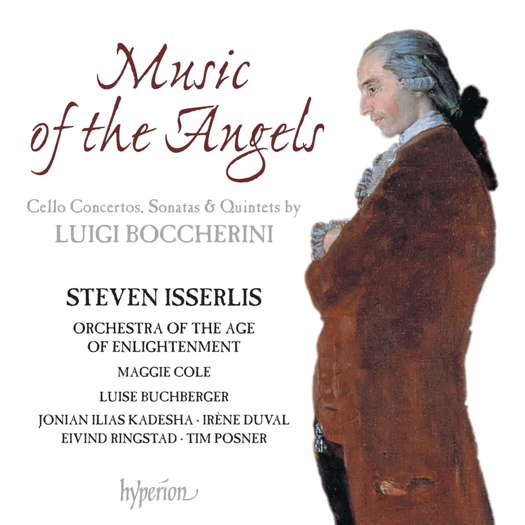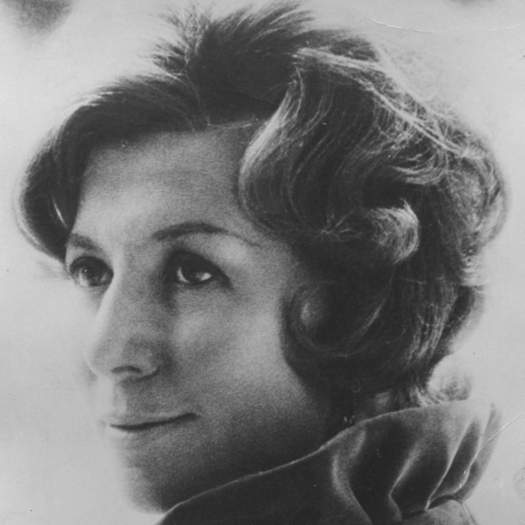- harp music
- Gerd Natschinski
- Roy Wales
- Galina Ustvolskaya
- Warner Music Italia Srl
- Quilter
- Powys
- Hansung Yoo

Rococo Charm
GERALD FENECH heartily recommends music by Boccherini, played by Steven Isserlis and friends
'... truly glorious performances ...'
Luigi Boccherini was born into a musical family in Lucca in 1743. He was the third child of Leopoldo, a cellist and double-bass player, and the brother of Giovanni, a poet and dancer who wrote libretti for Salieri and Haydn. When aged five Luigi received his first music lessons from his father who taught him cello and, when aged nine, he continued his studies with Abbé Vanucci, music director of a local cathedral at San Martino. Four years later he was in Rome, where he continued his studies with G B Costanzi.
In 1757 father and son both went to Vienna, where the court employed them as musicians in the Burgtheater. In 1768 Boccherini went to Madrid, entering in 1770 the employ of Infante Luis Antonio of Spain, younger brother of King Charles III. There the composer flourished under royal patronage, until one day when the King expressed his disapproval at a passage in a new trio and ordered the composer to change it. Boccherini, no doubt irritated with this intrusion into his art, doubled the passage instead, which led to his immediate dismissal.
Eventually, he accompanied Don Luis (the Infante) to Arenas de San Pedro, a little town in the Gredos Mountains in Avela; there and in the nearest town of Candeleda, Boccherini he wrote many of his most famous pieces. Later patrons included the French Ambassador to Spain, Lucien Bonaparte, as well as King Friedrich Wilhelm II of Prussia, himself an amateur cellist, flautist and avid supporter of the arts.
Listen — Boccherini: Minuet (String Quintet in E)
(CDA68444 track 16, 0:01-0:55) ℗ 2024 Hyperion Records :
Boccherini fell on hard times following the deaths of his Spanish patron (1785), his two wives (1785 and 1805) and his four daughters (1796, 1802 and 1804). He died in Madrid in 1805, survived by two sons. His body lay buried in the Pontifical Basilica of St Michael in Madrid until 1927, when his remains were repatriated and buried in the Church of San Francesco in his native Lucca.
Much of Boccherini's chamber music follows models established by Haydn; however the composer is often credited with improving the cello to prominence, whereas Haydn had often relegated it to an accompaniment role. Indeed, Boccherini wrote a large amount of chamber music, including over a hundred string quintets, twelve guitar quintets, nearly a hundred string quartets and a number of string trios and sonatas.
Listen — Boccherini: Tempo di minuetto amoroso (Cello Sonata in F)
(CDA68444 track 12, 0:00-0:47) ℗ 2024 Hyperion Records :
His orchestral music includes around thirty symphonies and twelve virtuoso cello concertos.
Listen — Boccherini: Adagio (Cello Concerto in D)
(CDA68444 track 2, 1:11-2:01) ℗ 2024 Hyperion Records :
Boccherini's style is characterized by Rococo charm, lightness and optimism, and exhibits much melodic and rhythmic invention, coupled with frequent influences from the guitar tradition of his adopted country Spain. Indeed, this inspiring compilation has all the musical ingredients referred to above, and Steven Isserlis, who plays the cello and conducts at the same time, and his team of exceptional soloists and the players of the Orchestra of the Age of Enlightenment, deliver some truly glorious performances that create a sound world all of its own - sublime, delightful, virtuosic and, most of all, brimming with orchestral refinement.
Listen — Boccherini: Rondo: Allegro (Cello Concerto in A)
(CDA68444 track 15, 3:07-4:07) ℗ 2024 Hyperion Records :
This is what Steven Isserlis has to say about Boccherini:
He must have been a truly wonderful player, one can feel it in the writing, as challenging as anything composed for the cello before the twentieth century at least. The great Russian cellist Gregor Piatigorsky, an avid Boccheriniphile, considered the composer to have been, on evidence of his music, the greatest cellist of all time.
Need I say more? Notes, sound and presentation are indeed worthy of the music. Heartily recommended.
Copyright © 20 November 2024
Gerald Fenech,
Gzira, Malta





